Enforce Hijab Before Women Come Out 'Naked' In Summer, Iran Cleric Says
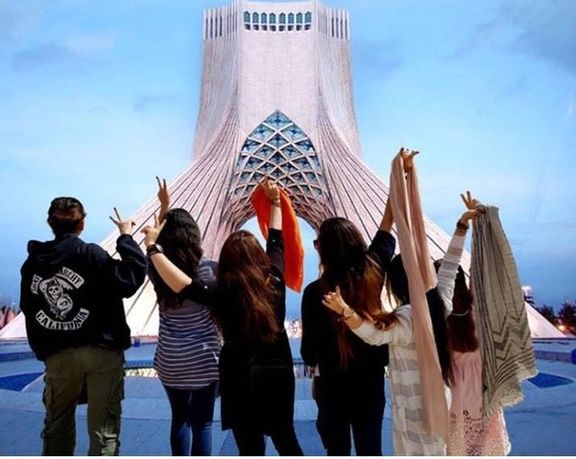
Friday imam of Ahvaz in southwestern Iran says the government will not back down in enforcing hijab, otherwise women will come to the street naked this summer.

Friday imam of Ahvaz in southwestern Iran says the government will not back down in enforcing hijab, otherwise women will come to the street naked this summer.
During a sermon on Friday, Mohammad Nabi Mousavifard called on the authorities to approve a law to deal with women who do not observe hijab.
“We have to pay for the preservation of religious values, even if we need to go to court several times,” he added.
Mousavifard further asked the judges to be very careful about such matters and enforce the law to deal with these “anomalies”.
“People and social service providers should stop giving services to people without hijab; People should give women with improper hijab warnings and not be indifferent, otherwise they will come to the street naked in the summer,” noted the cleric.
In January, the Supreme Leader’s representative in the city of Karaj said the reason for low precipitation and drought in the country is a lack of hijab observance, after many women took off their veils following months of protests.
Mohammad-Mehdi Hosseini Hamedani, the Friday prayer imam in Karaj, reiterated that observance of hijab should be enforced strictly in society.
"It is not possible to imagine that we are living in an Islamic country when we enter some institutions, shopping malls, pharmacies, etc.!" he said, calling on the authorities to warn shops and malls not to serve women who have removed their hijab and close them down if warnings did not suffice.

Reformist politicians as well as some conservatives in Iran continue to warn about the serious economic and political crises the Islamic Republic faces in 2023.
Hossein Marashi, the Secretary General of centrist Executives of Construction Party says: "I can say that Iran is on fire, and that this fire will not be extinguished unless various government institutions and their critics move in the direction of serving the country's national interests."
Speaking in an interview with Khabar Online, Marashi maintained that there is no way out of Iran's current crisis other than drafting a "collective national document" upon which everyone can agree. To this end, he said, wise people should be brought back to the country's management and the role of radicals should be limited to the scope of their social influence.
Marashi reiterated that Iran is in an extremely difficult and critical situation. He added that in such a situation, all those who believe in correcting the government's performance based on the existing Constitution and those with higher goals, including the ones who no longer believe in the Islamic Republic are part and parcel of this nation and should be respected.
His remarks follow a statement recently issued by opposition figure and former prime minister Mir-Hossein Mousavi, who demanded to hold a referendum for a new constitution.
Marashi said the amnesty granted to some protesters was a first step toward this goal. This comes while some activists have said although the government has spoken about pardoning tens of thousands of inmates, only less than 150 of those who have been released as of February 9 were jailed protesters.
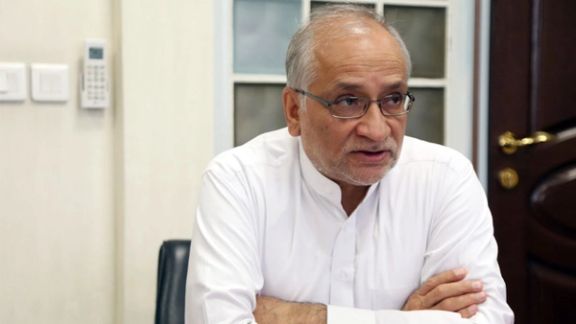
Meanwhile, Marashi said that the government should stop making decisions by individual players or in small groups of politicians who represent only a minority. All individuals, political parties, and private and public sector activists need to get together to save the country out of trouble.
He summarized some of Iran's problems pointing to a 52-percent inflation rate, an increasing budget deficit, and poor performance of the banks. He said it is a shame that an oil-rich country, which has the world's largest natural gas reserves is selling its properties to maintain the government's operations. This means, he said, that Iran's status has been downgraded.
The party leader added that hardliners pose the most serious threats to Iran. "They are a minoritythat wants Iran to be in constant conflict with the rest of the world while its people are suffering from poverty and sanctions. They do not have any solution for the country's problems and are not entitled to speak for everyone in Iran and their power should be limited to the extent of their real influence in the society. "
Meanwhile, conservative commentator Mohammad Mohajeri has told Nameh News that even some of Iran's hardliner conservatives who previously supported the government of President Ebrahim Raisi no longer want to be associated with it and share the responsibility for its economic, political, social, cultural and foreign policy failures particularly following the current wave of protests in Iran. These conservative supporters have chosen to go their separate ways to ensure their own political survival.
In another development, lawmaker Gholamreza Nouri Ghezelche has predicted that Iranians are likely experience more hardship in the coming months as the government seems to have given up the idea of solving the country's problems. This, he said, was evident in the budget bill the government presented to the parliament.
Ghezelche added that after one and half years in office, Raisi has yet to present a clear roadmap to the parliament, and no one knows where his government is headed. "He made so many promises in the areas of housing, economic growth, employment, fighting corruption and controlling inflation, but none of those promises have been met," he said.
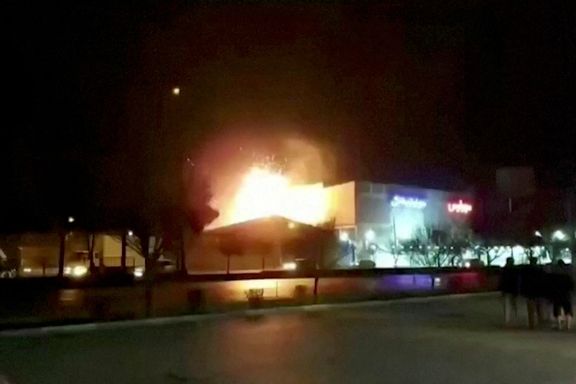
Iran’s ministry of intelligence and the IRGC in a joint statement have claimed that they arrested the "main agents" behind a recent drone attack on a military center in Esfahan.
In the statement, they have repeated the previous remarks by government officials, who had said Israel's "role" in the attack has been proven so far, but due to the "ongoing investigation", additional information will be published later.
The two intelligence arms of the Islamic Republic do not mention the number of people arrested and their identities in their joint statement, which was published on the eve of the 44th anniversary of the regime establishment.
Iranian regime has repeatedly made similar claims regarding the arrest of people who played a role in attacks, but they never presented any evidence.
Elsewhere in the statement, the intelligence agencies stressed that the recent drone attack failed, and Iran will respond.
On January 28, one of the Islamic Republic of Iran's military facilities in the city of Esfahan was targeted by a drone attack, and officials claimed the attack did not cause any casualties or damage, while videos taken by citizens showed a large explosion.
The defense ministry announced that the target of the attack was an ammunition factory hit by small drones.
A day later, the Wall Street Journal reported that Israel had carried out the drone attack on an Iranian military center for research and development.

The University of Medical Sciences in Iran’s southern city of Bandar Abbas has suspended and exiled several students because they had supported the protests.
Reports say the disciplinary committee of Bandar Abbas University of Medical Sciences has suspended at least five students for several terms.
Two other medical students have also been exiled and forced to transfer to other universities.
In recent weeks, several reports have been published regarding the expulsion of students for their participation in nationwide protests following the death of Mahsa Amini in police custody in September.
The Student Councils Union of the country announced Friday that 16 students and two professors have been suspended in the southeastern city of Zabol in connection with the recent nationwide protests.
According to the latest report by the US-based Human Rights Activists News Agency (HRANA), at least 720 students were arrested during the protests.
In an interview with the National Public Radio in the US this week, Iran’s foreign minister Hossein Amir-Abdollahian claimed no students or journalists were arrested during the protests.
So far, the exact number of suspended and expelled students have not been announced, but in addition to Bandar Abbas University, there have been similar cases of punishments at other universities.
Back in December, 12 students were expelled and 80 suspended in Bahonar University of Kerman in central Iran. Similar reports have been published about the universities of medical sciences in Kerman, Shiraz in the south, and Tabriz in the northwest.
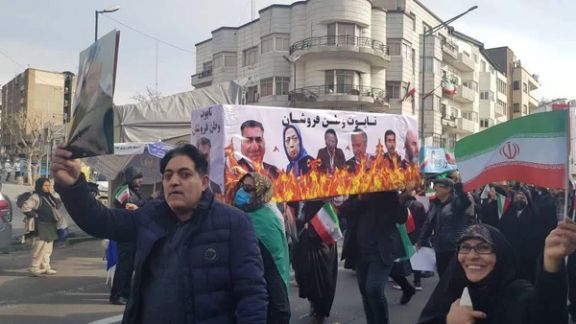
While Iran’s President Ebrahim Raisi was delivering his speech during the government organized revolution day ceremonies, hackers interrupted the broadcast.
Raisi was speaking in Tehran’s Azadi square where people were gathered to mark the 44th anniversary of the Islamic Republic, an occasion when the regime was determined to show that it still enjoys popularity.
The hacktivist group Ali’s Justice (Edalat-e Ali) hacked the broadcast from the state TV and aired the slogan “Death to Khamenei”. It also called on the people to withdraw their money from government banks and called on the people to take part in antigovernment protests on February 16.
The regime had forced students, millions of public sector employees and soldiers to take part in the gathering and parades in different cities, together with its own base of support among families of regime loyalists, clerics and the paramilitary Basij organization.
A Twitter user posted a comment that “Well, somehow you did accomplish your [revolution day] march, by threatening school children with reducing their grades, government employees with financial penalties…my question is: Did you solve our problems?”
Raisi in his speech said the regime will embrace those “who were deceived during riots”, referring to last year’s popular protests and welcome them back “into the embrace of the nation.” He spoke of Supreme Leader Ali Khamenei’s “fatherly love” and his magnanimity in pardoning detained protesters.
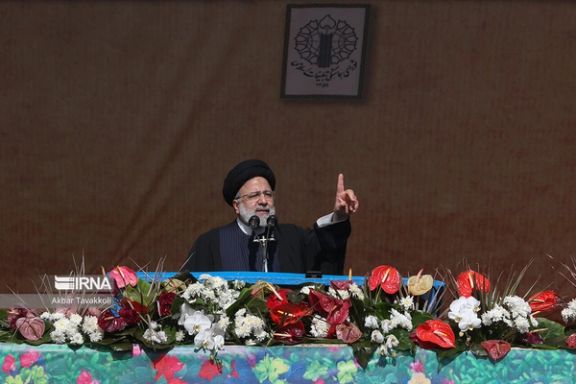
The president went on repeating the official propaganda line that foreigners instigated the protests to “destroy Iran”. The regime is adept at trying to equate itself with the country and its vital interests when it faces a serious challenge.
These remarks reveal that the hardliner core of the regime headed by Khamenei is in no mood to start some sort of dialogue, at least with former regime loyalists to somewhat pacify the anti-regime mood in the country.
However, former President Hassan Rouhani told local reporters during the ceremonies that “We should not allow a power-hungry minority to push the majority aside,” adding that this “would be the end of the [Islamic] revolution.”
He was clearly referring to hardliners and ultra-conservatives who have taken over both the legislature and the presidency with Khamenei’s support in the past three years.
The Islamic government should listen to diverse ideas and the people’s voice to guarantee the survival of the revolution, he added.
Regime officials use the term revolution as a synonym for the Islamic Republic.
In recent days, prominent former officials have demanded a revision of the constitution or a new one by forming a constituent assembly and holding referendums.
Former prime minister and leader of the reformist Green Movement, Mir-Hossein Mousavi in a statement issued earlier this month said the reform movement has failed and it is time to make “fundamental changes.” Mousavi’s call is tantamount to a regime change if people are allowed to freely vote for a new form of government.
Former President Mohammad Khatami also called for serious changes, although he stopped short of saying the Islamic Republic must go.
Meanwhile, eight prominent exiled activists, including Prince Reza Pahlavi and Nobel laureate Shirin Ebadi, held a joint forum in Washington DC on Friday signaling the launce of a united protest leadership in the diaspora.
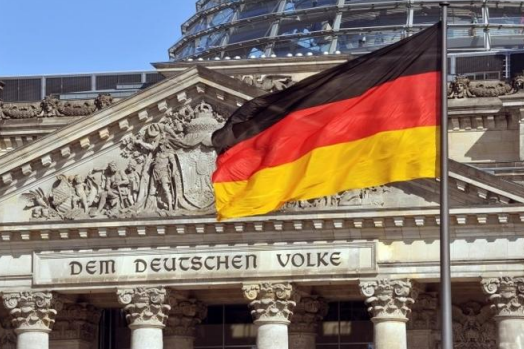
Germany has acknowledged an increase in spying by Iranian agents on exiled Iranians since the start of mass protests last year, Welt am Sonntag newspaper reported on Saturday.
Nationwide unrest triggered by the death of a young woman detained by Iranian morality police last year has led to "increasing indications of possible spying on opposition events and individuals" in Germany, the federal government said in response to an information request from the far-left Linke Party.
"Opposition groups and individuals (...) are considered by the rulers in Iran as a threat to the continued existence of the regime," the government said in its response.
It said the country's domestic intelligence service had identified 160 individuals with links to Germany as well as the Iranian Revolutionary Guards.
The Islamic Republic has persecuted exiled dissidents for four decades, often threatening, assassinating or kidnapping activists in Europe, including a former prime minister and several journalists.
The Revolutionary Guards' "extensive spying activities" are directed in particular against pro-Israeli and pro-Jewish targets in Germany, the newspaper cited the government as saying.
Demonstrations that first erupted in September over the death of a 22-year-old Kurdish woman who had been placed in detention by police enforcing the Islamic Republic's strict restrictions on women's dress have turned into the biggest protests in years.
Reporting by Reuters